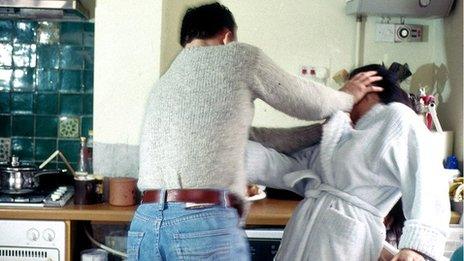Domestic abuse: 'Wide variations' in police referrals to CPS
- Published

Police in Cheshire referred on the highest proportion of domestic violence cases
There are significant variations across England and Wales in the way police and prosecutors deal with cases of domestic violence, figures show.
In Cheshire last year, 33% of domestic violence cases recorded as an offence were referred by police to prosecutors, with 21.47% in Dyfed Powys, they show.
But in Warwickshire the figure was 3.56% and in North Wales 5.25%.
Police are aware of inconsistencies, they said, adding more work was needed to help officers deal with cases.
For victims of domestic violence and rape, the decision to come forward to ask for help and protection can be excruciatingly difficult.
What figures seen by BBC Newsnight also reveal is how different that experience of speaking out can be, depending on where a victim lives, and the attitude and performance of their local police force.
'Emotive cases'
The statistics display significant variations in how detectives and local Crown Prosecution Service prosecutors proceed with cases and whether they are referred to the courts at all.
As well as the new figures for domestic violence, existing statistics for rape offences again show Cheshire police with high rates of referral - 65%; police in Durham pass nearly 57% of cases on to the CPS. But again in Warwickshire the figure is low, just 3.65%, and in Devon and Cornwall the statistic is 18%.
What can explain such wide variations?
Det Supt Steve Cullen, of Warwickshire Police, insists that it does not mean crimes are going unpunished.
Few cases may end up in court, but the region has higher than average conviction rates for those that do.
"Domestic violence and rape are complex and emotive crimes to investigate," he said.
Rather than refer high proportions on to the courts, Det Supt Cullen said Warwickshire had taken a decision to allow experienced detectives to make decisions early, in consultation with the CPS, on whether to hand cases over formally.
But sources acknowledged that the strain on resources is a factor in the number of cases that proceed to court in that region.
'Having to prioritise'
One told Newsnight: "It is concerning that we have such low referral rates… resources at the CPS are part of the problem, every agency is suffering.
"Cuts mean we are having to prioritise high-risk cases."
Another source said: "We have to recognise the caseload of the CPS".
But as all police forces are having to deal with smaller budgets, do local attitudes and culture also play a part?
Professor Liz Kelly, of London Metropolitan University - an expert in the study of sexual violence - suggests variations in some cases can be explained by local police priorities.
She said: "This isn't to do with the profile of the cases, it's to do with the profile of the issue in that local area, whether the chief constable says it's important, whether all of the sergeants say it's important, whether the constables feel it's their responsibility to protect women - these are the things that make a difference."
Shadow home secretary Yvette Cooper said nationally only 6% of recorded domestic abuse cases reached a conviction.
"There's been a 14% fall in prosecutions despite an increase in recorded incidents of 11%," she said.
"Performance has collapsed in rape cases too and there are massive variations across the country."
She said a Labour government would publish league tables for how the police and local prosecutors performed on domestic violence and rape cases, and would introduce a domestic violence commissioner, following the model of the children's commissioner, to develop and monitor new national standards.
The Association of Chief Police Officers said: "We have substantially improved with investment in specialist officers, training our call handlers to identify those most at risk… but we know there are inconsistencies between forces and that we have more to do to ensure that every police officer is equipped to deal with the complexity of abuse that can take many forms."
Correction 11 March 2014: This story has been amended after it was discovered figures provided by Labour had transposed numbers of referrals for Northumbria and North Yorkshire, resulting in incorrect percentages for those forces.
- Published10 March 2014
- Published8 March 2014
- Published5 March 2014
- Published26 February 2014
- Published3 December 2013